Launching the #CPUOverload Project: Testing Every x86 Desktop Processor since 2010
by Dr. Ian Cutress on July 20, 2020 1:30 PM ESTGaming Tests: Red Dead Redemption 2
It’s great to have another Rockstar benchmark in the mix, and the launch of Red Dead Redemption 2 (RDR2) on the PC gives us a chance to do that. Building on the success of the original RDR, the second incarnation came to Steam in December 2019 having been released on consoles first. The PC version takes the open-world cowboy genre into the start of the modern age, with a wide array of impressive graphics and features that are eerily close to reality.
For RDR2, Rockstar kept the same benchmark philosophy as with Grand Theft Auto V, with the benchmark consisting of several cut scenes with different weather and lighting effects, with a final scene focusing on an on-rails environment, only this time with mugging a shop leading to a shootout on horseback before riding over a bridge into the great unknown. Luckily most of the command line options from GTA V are present here, and the game also supports resolution scaling. We have the following tests:
- 384p Minimum
- 1440p Minimum
- 8K Minimum
- 1080p Max
For that 8K setting, I originally thought I had the settings file at 4K and 1.0x scaling, but it was actually set at 2.0x giving that 8K. For the sake of it, I decided to keep the 8K settings.
For automation, despite RDR2 taking a lot of inspiration from GTA V in its command line options and benchmark, the only feature it didn’t take was the actual flag that runs the benchmark. As a result, we have to use key presses on loading into the game in order to run the benchmark and get the data. It’s also worth noting that the benchmark results file is only dumped after the game has quit, which can cause issues in scripting when dealing with pauses (slow CPUs take a long time to load the test). The settings file accepts our pre-prepared versions along with the command line for ignoring new hardware, and the output files when you get them have all the frame times as required.
| AnandTech | IGP | Low | Medium | High |
| Average FPS | 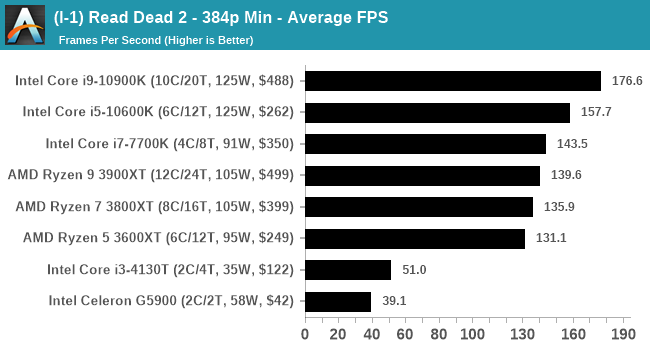 |
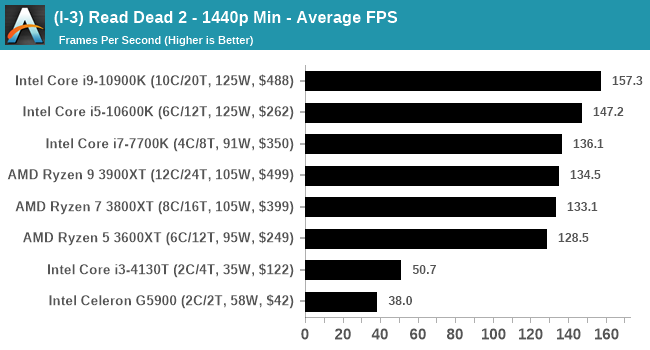 |
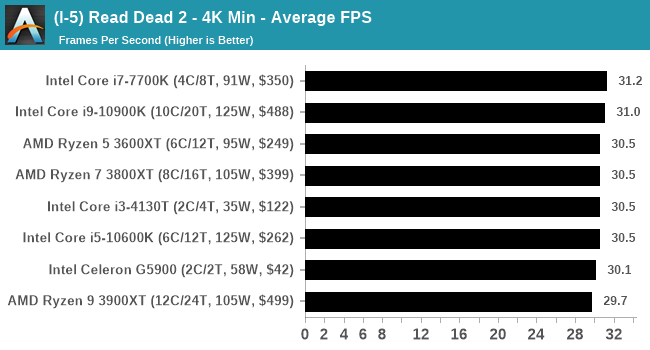 |
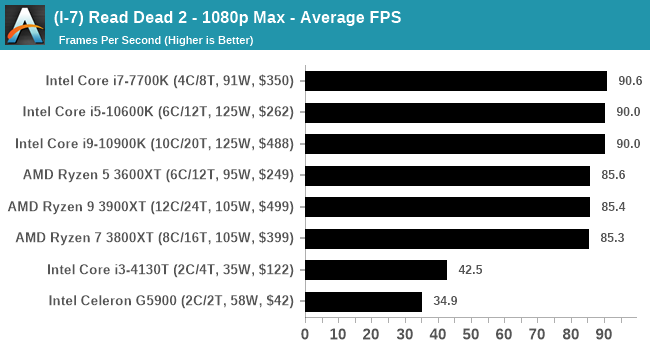 |
| 95th Percentile | 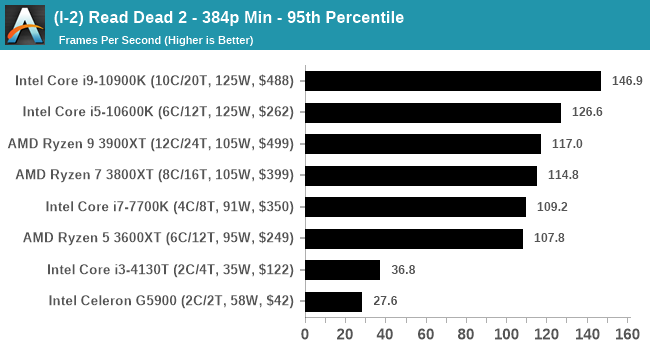 |
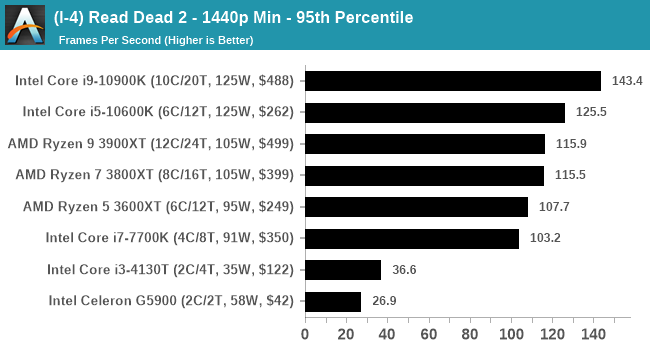 |
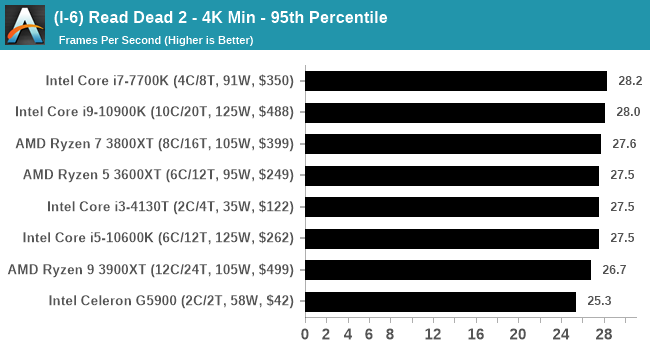 |
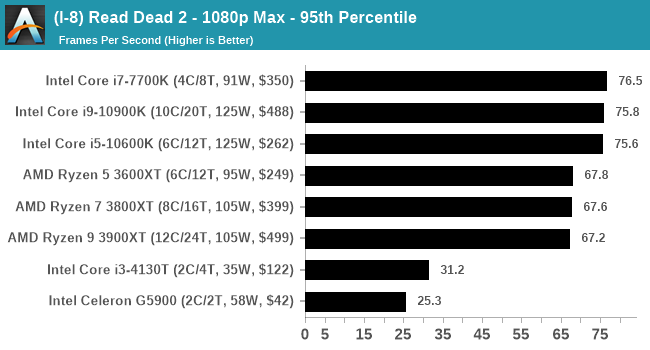 |
All of our benchmark results can also be found in our benchmark engine, Bench.












110 Comments
View All Comments
PeachNCream - Tuesday, July 21, 2020 - link
You don't get what it means to perform a controlled test do you?Aspernari - Wednesday, July 22, 2020 - link
It's important to note that the environment is not actually well-controlled.https://twitter.com/IanCutress/status/128480609693...
We don't know temperature for the operating conditions for these tests, which matters more and more for boost behavior for CPUs and GPUs. He says 36c when he got into the office, we'll never know what the temperature peaked at, nor how often similar conditions were reached.
A standard platform is a good choice, but a controlled environment is also important. Unfortunately, the results aren't as reliable as they otherwise might have been.
PeterCollier - Wednesday, July 22, 2020 - link
And that's why this entire test is a complete waste of time. Something like Geekbench or especially Userbench is much, much better because it gives you a range of scores. Instead of trying to create false precision by saying that a AMD 4700U scored, say, a "979" on a benchmark, Userbench will say that all the 4700U's tested scored from 899 to 1008, and break it down into percentiles. This way, you have a range of expected performance in mind instead of being fixated on that "979" number, which could have been obtained in an unrealistic scenario.Rudde - Saturday, July 25, 2020 - link
Isn't userbench a synthetic together with geekbench? What exactly are they testing? Instead of knowing which of Intel i7 10700k and AMD ryzen 7 3800X is better at rendering, video encoding, number crunching or whatever your use case is, you'll get a distribution based on a largely unknown test. The Intel and AMD processors might end up being within error margins of each other in your use case, but that in itself tells something too. All benchmarks are inherently bad; there is not a single benchmark that captures every use case while not being affected by its environment (ram speeds, temperatures, etc). I prefer tests that I understand, over tests that I do not understand.bananaforscale - Wednesday, July 22, 2020 - link
One could ask what the point of Userbenchmark is in these days of quadcores being basically entry level while the benchmark has DECREASED its multicore weighting.A5 - Monday, July 20, 2020 - link
For my own personal test, getting an i7-4770K in the list would be a big help.Once you have a compile test, a Xeon E5-1680v3 would be nice to see so that I can sell my corp on newer workstations...
Shmee - Wednesday, July 22, 2020 - link
Those are great Haswell EP CPUs, and they OC too! I have an E5-1660v3 in my X99 rig.Mockingtruth - Monday, July 20, 2020 - link
I have a 3570k and a E8600 spare with respective motherboards and ram if useful?CampGareth - Monday, July 20, 2020 - link
Personally I'd like to see a Xeon E5-2670 v1 benchmarked. I'm still running a pair of them as my workstation but these days AMD can beat the performance on a single socket and halve the power consumption.Samus - Tuesday, July 21, 2020 - link
Do you run them in an HP Z620? I ran the same system with the same CPU’s for years at one of my clients. What a beast.